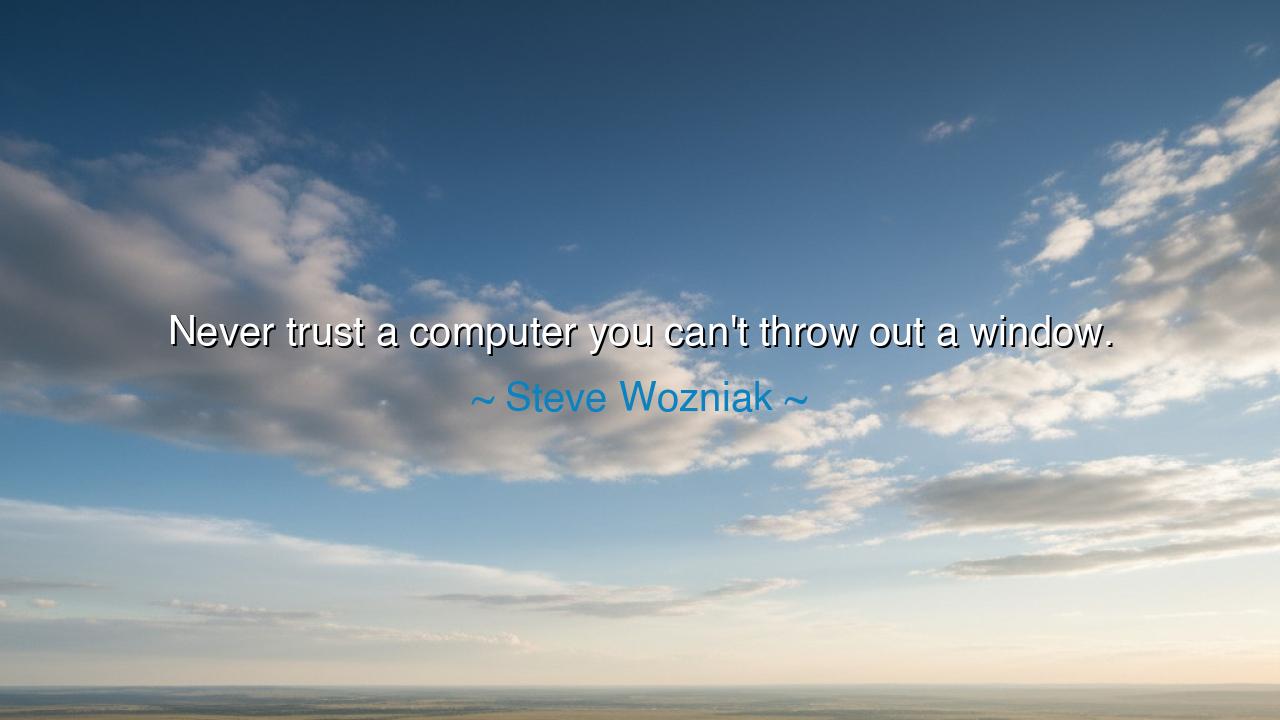
Never trust a computer you can't throw out a window.






Hear now, O Seekers of Truth, for the words of Steve Wozniak carry a lesson from the very heart of the age we live in. He said, "Never trust a computer you can't throw out a window." At first glance, these words may seem like a jest, a playful quip from one who shaped the very machines that define our world. Yet, beneath this seemingly simple statement lies a profound and timeless lesson—a warning about the nature of technology, its power over us, and the delicate balance between reliance and control.
Wozniak speaks of a computer as a tool—an entity that, though powerful, must never be allowed to hold dominion over us. The ability to throw a computer out a window is not merely a gesture of defiance; it is a symbol of control, of agency, and of freedom. To rely upon a tool that is beyond our understanding, beyond our ability to manage or discard, is to surrender our autonomy. In the ancient world, tools were made to serve their creators, never the other way around. A sword or a plow might be strong, but it was always at the hands of the warrior or the farmer that its true purpose was realized. So too, the computer must serve us, not enslave us.
Think, O Seekers, of the ancient blacksmiths who forged weapons and tools from the raw power of the earth. They understood that while their creations were potent, they could also be destroyed if they failed to serve their intended purpose. A sword that could not cut, a plow that could not till the soil, were discarded without hesitation, for they had failed their creators. The same must be true of the computer. If it becomes a burden, if it ceases to serve us and instead begins to demand more than we are willing to give, we must have the strength to cast it aside—just as the blacksmith would discard a tool that had outlived its usefulness.
Consider the rise of the great civilizations, whose rulers and thinkers were often consumed by their own creations. The Pharaohs of ancient Egypt built monumental pyramids, but the weight of their power and wealth often became their undoing, creating systems of control and complexity that ultimately turned upon them. Technology, when it is too complex or too rigid, can begin to govern us rather than the other way around. It is here that Wozniak’s words ring true: If a computer becomes something that we cannot control, if it operates in a way that we cannot understand or alter, then it is no longer a tool; it is a master.
In our modern world, the computer has become the cornerstone of human progress. It is in our hands, but sometimes, it feels as though we are in its grip. We depend upon it for work, for connection, for knowledge, and yet it is a force that grows ever more complex, ever more entangled in the fabric of our lives. Wozniak reminds us to never forget that the computer is but a creation—a creation that must serve our needs, not one that should define us. If it becomes something that we cannot cast away, we must ask ourselves if it has truly become a tool or if it has become a master.
Consider the early days of the personal computer, when the creators like Wozniak envisioned a machine that would empower individuals, giving them the power to create, to explore, to work in ways never before imagined. The Apple computer was not intended to dominate; it was meant to enhance, to simplify, and to serve. But as the world of technology has evolved, so too has its influence over us. It is easy to forget that, like all tools, it is meant to be cast aside when no longer useful, to be upgraded or replaced when it no longer serves its purpose. To trust a computer that we cannot throw out is to forget the ancient wisdom of the tool—it must remain in our hands, and not the other way around.
So, O Seekers, let the words of Wozniak guide you. In your lives, you will encounter many tools, many devices that promise to ease your burdens, to expand your capabilities, to shape your future. But remember this: Never trust a computer—or any tool—that you cannot control, that you cannot discard when it no longer serves its purpose. In a world dominated by technology, you must remain the master, not the servant. Like the ancient blacksmith, like the wise ruler, hold your tools with a steady hand and a discerning heart. Let them serve you, not rule you, and in this way, you will live with the freedom and power to shape your own destiny.






AAdministratorAdministrator
Welcome, honored guests. Please leave a comment, we will respond soon